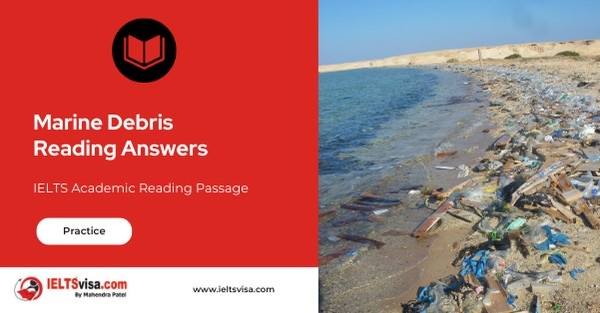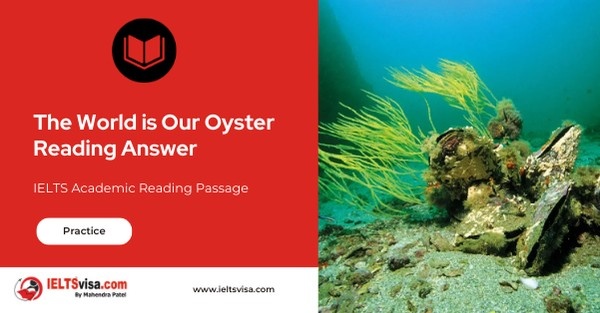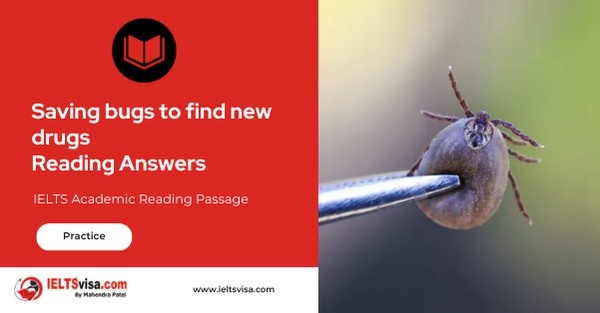Marine Debris Reading Answers
IELTS Academic Reading Passage
Chelsea Rochman, an ecologist at the University of California, Davis, has been trying to answer a dismal question: Is everything terrible, or are things just very, very bad?
Rochman is a member of the National Center for Ecological Analysis and Synthesis’s marine-debris working group, a collection of scientists who study, among other things, the growing problem of marine debris, also known as ocean trash. Plenty of studies have sounded alarm bells about the state of marine debris; in a recent paper published in the journal Ecology, Rochman and her colleagues set out to determine how many of those perceived risks are real.
Often, Rochman says, scientists will end a paper by speculating about the broader impacts of what they’ve found. For example, a study could show that certain seabirds eat plastic bags, and go on to warn that whole bird populations are at risk of dying out. ‘But the truth was that nobody had yet tested those perceived threats,’ Rochman says. ‘There wasn’t a lot of information.’
Rochman and her colleagues examined more than a hundred papers on the impacts of marine debris that were published through 2013. Within each paper, they asked what threats scientists had studied – 366 perceived threats in all – and what they’d actually found.
In 83 percent of cases, the perceived dangers of ocean trash were proven true. In the remaining cases, the working group found the studies had weaknesses in design and content which affected the validity of their conclusions – they lacked a control group, for example, or used faulty statistics.
Strikingly, Rochman says, only one well-designed study failed to find the effect it was looking for, an investigation of mussels ingesting microscopic bits. The plastic moved from the mussels’ stomachs to their bloodstreams, scientists found, and stayed there for weeks – but didn’t seem to stress out the shellfish.
While mussels may be fine eating trash, though, the analysis also gave a clearer picture of the many ways that ocean debris is bothersome.
Within the studies they looked at, most of the proven threats came from plastic debris, rather than other materials like metal or wood. Most of the dangers also involved large pieces of debris – animals getting entangled in trash, for example, or eating it and severely injuring themselves.
But a lot of ocean debris is ‘microplastic’, or pieces smaller than five millimeters. These may be ingredients used in cosmetics and toiletries, fibers shed by synthetic clothing in the wash, or eroded remnants of larger debris. Compared to the number of studies investigating large-scale debris, Rochman’s group found little research on the effects of these tiny bits. ‘There are a lot of open questions still for microplastic,’ Rochman says, though she notes that more papers on the subject have been published since 2013, the cutoff point for the group’s analysis.
There are also, she adds, a lot of open questions about the ways that ocean debris can lead to sea-creature death. Many studies have looked at how plastic affects an individual animal, or that animal’s tissues or cells, rather than whole populations. And in the lab, scientists often use higher concentrations of plastic than what’s really in the ocean. None of that tells us how many birds or fish or sea turtles could die from plastic pollution – or how deaths in one species could affect that animal’s predators, or the rest of the ecosystem.
‘We need to be asking more ecologically relevant questions,’ Rochman says. Usually, scientists don’t know exactly how disasters such as a tanker accidentally spilling its whole cargo of oil and polluting huge areas of the ocean will affect the environment until after they’ve happened. ‘We don’t ask the right questions early enough,’ she says. But if ecologists can understand how the slow-moving effect of ocean trash is damaging ecosystems, they might be able to prevent things from getting worse.
Asking the right questions can help policy makers, and the public, figure out where to focus their attention. The problems that look or sound most dramatic may not be the best places to start. For example, the name of the ‘Great Pacific Garbage Patch’ – a collection of marine debris in the northern Pacific Ocean – might conjure up a vast, floating trash island. In reality though, much of the debris is tiny or below the surface; a person could sail through the area without seeing any trash at all. A Dutch group called ‘The Ocean Cleanup’ is currently working on plans to put mechanical devices in the Pacific Garbage Patch and similar areas to suck up plastic. But a recent paper used simulations to show that strategically positioning the cleanup devices closer to shore would more effectively reduce pollution over the long term.
‘I think clearing up some of these misperceptions is really important,’ Rochman says. Among scientists as well as in the media, she says, ‘A lot of the images about strandings and entanglement and all of that cause the perception that plastic debris is killing everything in the ocean.’ Interrogating the existing scientific literature can help ecologists figure out which problems really need addressing, and which ones they’d be better off – like the mussels – absorbing and ignoring.
Questions 27-33
Do the following statements agree with the information given in Reading Passage 3?
In boxes 27-33 on you answer sheet, write
TRUE if the statement agrees with the information
FALSE if the statement contradicts the information
NOT GIVEN if there is no information on this
27 Rochman and her colleagues were the first people to research the problem of marine debris.
28 The creatures most in danger from ocean trash are certain seabirds.
29 The studies Rochman has reviewed have already proved that populations of some birds will soon become extinct.
30 Rochman analysed papers on the different kinds of danger caused by ocean trash.
31 Most of the research analysed by Rochman and her colleagues was badly designed.
32 One study examined by Rochman was expecting to find that mussels were harmed by eating plastic.
33 Some mussels choose to eat plastic in preference to their natural diet.
Questions 34-39
Complete the notes below.
Choose ONE WORD ONLY from the passage for each answer.
Write your answers in boxes 34-39 on your answer sheet.
Findings related to marine debris
Studies of marine debris found the biggest threats were
- plastic (not metal or wood)
- bits of debris that were 34………………………….. (harmful to animals)
There was little research into 35…………………………. e.g. from synthetic fibres.
Drawbacks of the studies examined
- most of them focused on individual animals, not entire 36 ………………………..
- the 37…………………….. of plastic used in the lab did not always reflect those in the ocean
- there was insufficient information on
– numbers of animals which could be affected
– the impact of a reduction in numbers on the 38……………………….. of that species
– the impact on the ecosystem
Rochman says more information is needed on the possible impact of future 39………………………… (e.g. involving oil).
Question 40
Choose the correct letter, A, B, C or D.
Write the correct letter in box 40 on your answer sheet.
40 What would be the best title for this passage?
A Assessing the threat of marine debris
B Marine debris: who is to blame?
C A new solution to the problem of marine debris
D Marine debris: the need for international action

Solution For: Marine Debris
Reading Answers
| 27. FALSE | 28. NOT GIVEN |
| 29. FALSE | 30. TRUE |
| 31. FALSE | 32. TRUE |
| 33. NOT GIVEN | 34. large |
| 35. microplastic | 36. populations |
| 37. concentrations | 38. predators |
| 39. disasters | 40. A |
Review and Practice
- Regularly practice with IELTS reading samples and time yourself to get used to the pressure of the exam.
- Review your mistakes to understand where you went wrong and how to avoid similar errors in the future.
Our Books
Master IELTS Speaking Part 1
IELTS Writing Task 1 Book
IELTS Writing Task 2 Book
Marine Debris Reading Answers Explanation
Comin Soon
Practice IELTS Other Modules
IELTS Listening
The IELTS Listening test assesses how well you can understand spoken English in various contexts. It lasts about 30 minutes and is divided into four sections with a total of 40 questions. The listening tasks become increasingly difficult as the test progresses.
IELTS Academic Reading
The IELTS Academic Reading section assesses your ability to understand and interpret a variety of texts in academic settings. It is designed to evaluate a range of reading skills, including skimming for gist, reading for main ideas, reading for detail, understanding inferences, and recognizing a writer's opinions and arguments.
IELTS Speaking
The IELTS Speaking test assesses your ability to communicate in English on everyday topics. It lasts 11-14 minutes and consists of three parts: introduction, cue card, and a discussion based on the cue card topic.
IELTS General Reading
IELTS General Reading tests your ability to understand and interpret various types of texts. Here are some key areas and types of content you can expect to encounter in the reading section, along with tips for effective preparation.
IELTS Academic Writing Task 1
In IELTS Academic Writing Task 1, you are presented with a visual representation of information, such as graphs, charts, tables, or diagrams, and you are required to summarize, compare, or explain the data in your own words.
IELTS General Writing Task 1
In IELTS General Writing Task 1, you are required to write a letter based on a given situation. The letter can be formal, semi-formal, or informal, depending on the prompt. Here’s a breakdown of the key components to include in your letter
IELTS Academic Writing Task 2
In IELTS Academic Writing Task 2, you are required to write an essay in response to a question or topic. Here’s a guide to help you understand the essential elements of this task
IELTS Exam Tips
To succeed in the IELTS exam, practice regularly, familiarize yourself with the test format, improve your vocabulary, develop time management skills, and take mock tests to build confidence.
Grammer for IELTS
Grammar is the foundation of effective communication in English. Understanding tense usage, subject-verb agreement, and sentence structure enhances clarity and coherence in writing and speaking.
Vocabulary for IELTS
Vocabulary plays a crucial role in the IELTS (International English Language Testing System) exam, especially in the Speaking and Writing sections. Here’s an overview of why vocabulary is important and how it impacts your performance
RECENT IELTS SAMPLES QUESTIONS AND ANSWERS
Back to the Future Skyscraper Design
A. “The Recovery of Natural Environments in Architecture” by Professor Alan Short represents...
UNMASKING SKIN
AIf you took off your skin and laid it flat, it would cover an area of about twenty-one square...
The World is Our Oyster Reading Answer
A. Independent travel is on the increase and while package holidays which offer an all...
Investigating Children’s Language
A For over 200 years, there has been an interest in the way children learn to speak and...
Why companies should welcome disorder
A Organisation is big business. Whether it is of our lives – all those inboxes and calendars –...
Saving bugs to find new drugs
A More drugs than you might think are derived from, or inspired by, compounds found in living...













